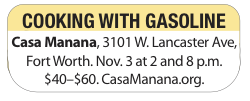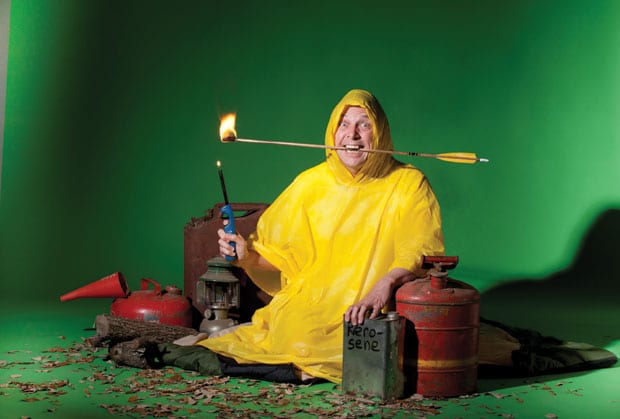Now that ‘Greater Tuna’ is no more, Jaston Williams strikes a match with his autobiographical one-man show ‘Cooking with Kerosene’

APRES TUNA, LE DELUGE | Jaston Williams may have said goodbye to the Tuna plays, but he’s busier than ever with his newest one-man show, about his troublemaking youth in the Texas Panhandle.
ARNOLD WAYNE JONES | Life+Style Editor
 When Jaston Williams and his creative partner of 30 years, Joe Sears, announced this summer that they would no longer tour with the Tuna plays — a “four part trilogy,” as they call it, set in the tiny Texas town of Tuna — some people probably sighed with sadness that they would never see these master comic actors at work again.
When Jaston Williams and his creative partner of 30 years, Joe Sears, announced this summer that they would no longer tour with the Tuna plays — a “four part trilogy,” as they call it, set in the tiny Texas town of Tuna — some people probably sighed with sadness that they would never see these master comic actors at work again.
Williams was not one of them. He knew better.
“Tuna had a helluva run and I can never be grateful enough for it and the people it reached and what it provided me,” he says from his home in Lockhart, Texas. “The trick with the
Tuna plays was doing something very difficult and making it look easy. It takes a toll on you. You ask yourself, ‘What is this now in my life and what is this preventing me from doing?’”
And he had an answer.
First off, Williams is happy to be able to spend Christmases at home with his family rather than doing backstage quick-changes from one redneck to another. But even more importantly, he finally gets to pursue some projects that have long been relegated to the backburner.
In the winter, he’ll revive the one-man play Tru, in which he gets to play Truman Capote, with Dallas’ Larry Randolph directing. And this weekend, he’s Cooking with Gasoline.
That’s the name of Williams’ newest work, a trilogy of autobiographical stories that ramble down memory lane while exploring what it means to be male.
“It’s about my experience in the Boy Scouts in the Panhandle, but it’s really about what it means to be a boy — raising, being, adopting and how boys can save each others’ lives,” Williams says.
Williams admits the questionable behavior of the fellas in his troop — called the Flaming Arrows — wouldn’t exactly get them featured in Boy’s Life.
“The Boy Scouts motto is ‘be prepared,’ but they didn’t say be prepared for what,” he says. “Most Scouts [bragged] they could start a fire with one match; we’d pour gasoline on a pile of wood and somebody would toss in a cigarette.”
Their raucousness eventually proved too much for their Scoutmaster. “He had two daughters and always wanted sons so he worked out his father-son issues in Scouting,” Williams says.
“After a year-and-a-half, he packed up and moved to Oklahoma.”
Williams has reached an age where his perspective has softened the actions of his youth.
“It was just as the Beatles were happening and life was changing drastically in small towns and we knew there was something else out there,” Williams opines.
“The first Scout camp we went to was disastrous,” he says. “They have these guys, young men, who serve as counselors — quiet boys, between the ages of 17 and 20 with big calves. If you’re spending your summers at that age in the woods then you weren’t lookin’ for women.” The Flaming Arrows (aptly named) didn’t make it easy on them.
“We recruited every thug in town for our troupe. They decided everyone should put on some performance that summer; we wanted to do a drag strip tease and they ended up canceling the evening entirely.”
But the stronger message is one of community and a begrudging maturity.
“We were against the grain, but underneath it all we were good kids; it wasn’t that we didn’t have hearts,” he says. “At summer camp one year], one boy’s brother was killed in an auto accident and we counseled him — and we were good. A lot of what this whole evening is about is the sanctity of boyhood.”
It’s personal for Williams; he and his partner are adopted parents to a special-needs teenager, and Williams was inspired by the strength of boys across the world when he visited Guatemala years ago.
“I spent about a week there but a friend of mine and I ended up on an active volcano with a bunch of German tourists,” he recalls. They genuinely feared that they might be caught in a lava floe, when “this barefoot boy, about 11 or 12 year old, just kind of appeared out of nowhere and helped us down the mountain. He knew every rock on that path and knew just what he was doing. Watching him reminded me about my childhood and how you find those things that connect you.”
Cooking with Gasoline was the result.
“I opened it in Galveston at the Grand Opera House last summer to packed houses — people went nuts for it,” he says. He brings the show to Fort Worth’s Casa Manana Theatre for two performances on Saturday (a matinee and evening show). And in some ways it couldn’t be further from Tuna.
“Tuna [is well-observed], but all my stories really happened!” Williams insists. “I am so grateful for Tuna, have a lot more stories to tell and I didn’t want to tell them through Tuna. And [Cooking with Gasoline] gets into something I love about Texans, which is that we are great storytellers. That’s an art form.”
It certainly is whenever Jaston Williams tells a tale.
This article appeared in the Dallas Voice print edition November 2, 2012.

